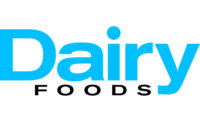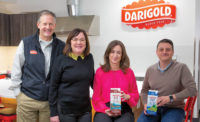In the sharing economy, you can ride around town in the personal car of a complete stranger (Uber) and ask the driver to drop you off at the apartment of a completely different stranger where you’ll spend the night (Airbnb). Sharing (actually, it is selling) underused resources is how to grow a business today.
Of course, this is nothing new to dairy processors. But rather than calling it sharing, they call it contract manufacturing or co-packing. It’s a common practice for dairies to fire up their processing equipment to manufacture dairy-based (and nondairy) foods and beverages for other companies.
Start-ups and established dairy businesses alike are potential customers for co-packing or contract manufacturing services.
When Brandon Partridge developed a drinkable yogurt called Ibex, he interviewed processors and researched the contract manufacturing industry before selecting one in New York state.
Along the way, the CEO of Skyland Foods, Washington, D.C., learned a few things about choosing a partner. First, make sure that the dairy is committed to the idea of contract manufacturing. If the plant is only willing to co-pack because it currently has excess capacity now, what will happen to your product when the dairy’s own business picks up? Partridge asked.
Second, it is beneficial to work with a dairy that is proportional in size to your business. That doesn’t mean both parties have to have similar revenues or output. Instead, Partridge said, be worried that a mega-dairy might overlook the small run sizes required by a start-up business.
Third, choose a manufacturer with expertise in the product. That might seem obvious, but just because a dairy has the equipment does not mean it can make your specific product. The manufacturer that Partridge chose (Sunrise Family Farms) knew how to make yogurt. “It was expert in the product type,” he said, and “Ibex was better because of Sunrise.”
Although he had some success with consumers, and Dairy Foods named Ibex Drinkable Yogurt one of the best products of 2013, Partridge eventually shut down Skyland Foods.
Billions in private label
Some grocery and convenience store chains operate their own dairy processing plants. Kroger, Safeway, Publix, Ingles and Kwik Trip are some retailers that process milk, cottage cheese, ice cream and other foods for their own accounts.
But other chains seek manufacturers to process their store brands. Making these private label products is a billion-dollar business. Two-thirds of the milk sold at retail is a store brand. In 2014, 2.8 billion units of milk (valued at $8.9 billion) were private label, according to the Private Label Manufacturers Association.
More than half the shredded/grated cheese sold in retail outlets in the United States last year was private label. It was worth $2.9 billion. Private label ice cream doesn’t compete well with branded product in supermarkets; 25.7% of the units sold are store brands. Still, it represents $1.1 billion in sales. Private label yogurt is even smaller, with 13.6% of the units (685.5 million) and 9.8% of the dollars ($714.9 million).
What dairy processor wouldn’t want some piece of that action? The spectrum of contract manufacturing partners ranges from entrepreneurs like Partridge who don’t have the wherewithal to build their own plant to established dairy processors who don’t have the expertise to make a specific dairy category.
Another reason why a dairy processor might outsource its production is that it is introducing a new product and wants to mitigate risk, said Terry Pallister, director of contract manufacturing at Tetra Pak, Denton, Texas. They don’t want to tie up capital in production equipment in case the product fails, he said. On the other hand, if the product succeeds, it might then be more efficient to make the necessary capital expenditures and bring the manufacturing in house.
Tetra Pak, a supplier of processing equipment and packaging, doesn’t co-pack. If a brand wants to use its packaging, Tetra Pak refers the brand to its network of dairy processors. “We have strong relationships with brand owners and we bring business to manufacturers,” Pallister said.
Typically, it is the value-added products (not commodity white milk) like milks with added calcium, fiber or protein that are suitable for the company’s packaging. Business in nondairy beverages (especially almond milk and coconut water) is “exploding,” he said.
At Tetra Pak’s pilot plant in Denton, dairy brands can run products, formulate with different ingredients and taste how any changes affect the flavor profile, Pallister said.
HP Hood, a processor of dairy and nondairy products based in the Boston area, has plants across the United States. It offers contract manufacturing services and also outsources the production of some of its own brands, like ice cream. So it knows both sides of the relationship very well.
Be a true partner
What makes for a good relationship between a brand and a co-packer? In a word, “trust,” said Jeffrey P. Andrews, Hood’s senior director for contract manufacturing. Ideally, he said, the relationship will be a long-term one, meaning three to seven years. Over that span, there can be disruptive events, like bad forecasts or assumptions, ingredient shortages and manufacturing problems. The partners just have to work through them, he said.
“Both parties have to consider it as a partnership,” said David Crisp, the chief business development officer for O-AT-KA Milk Products Cooperative, Batavia, N.Y. That means a brand has to be forthcoming about taste and texture profiles, for example, as well as be realistic about sales goals. The cooperative makes various ready-to-drink beverages, coffee drinks, protein shakes and nutritional drinks, among other products.
Brands should take into account a manufacturer’s experience and consider its advice regarding ingredients, formulating and processing. When a brand allows a manufacturer to have input on formulation and product claims (including legal issues), “we can have their back,” Crisp said.
In selecting a manufacturing partner, look for one that can contribute to the success of the launch, rather than one that simply makes the product, Crisp said. That means the ability to offer insights into the marketplace, from the consumer and the retailer perspective. Retailers don’t need a me-too product. They want products with unique features and benefits. A good manufacturing partner can guide a brand in product development and help them build the category, Crisp said.
A large company like Hood (annual revenues of $2.5 billion) can leverage its purchasing relationships to benefit its contract partners. It doesn’t mark up packaging, ingredients and other supplies; rather it makes money by charging a manufacturing (or tolling) fee, Andrews said.
While Hood handles large accounts (Andrews described Hood as the nation’s largest maker of private label Greek yogurt, and makes almond milk for the Blue Diamond Growers cooperative), Andrews said Hood does take on small brands. Small companies are innovators, he said, pointing to Muscle Milk, which was eventually acquired by food giant Hormel in 2014. Andrews said his company “nurtures” start-up operations.
Partridge likened the search for a co-packer to dating. You might not find everything lines up perfectly, but make sure you agree on the important things, he said.
The annual Private Label Show, put on by the PLMA, attracts a large number of milk, cheese, ice cream, gelato and yogurt processors who exhibit and show off their capabilities. This year’s show is Nov. 15 to 17 in Rosemont, Ill. See plma.com.
More Resources
View our exclusive list of dairy processors offering contract manufacturing services (PDF)





